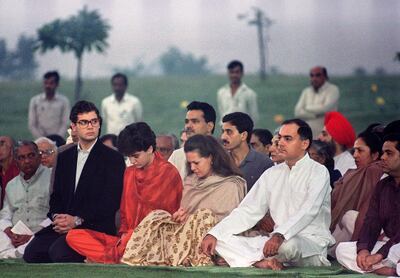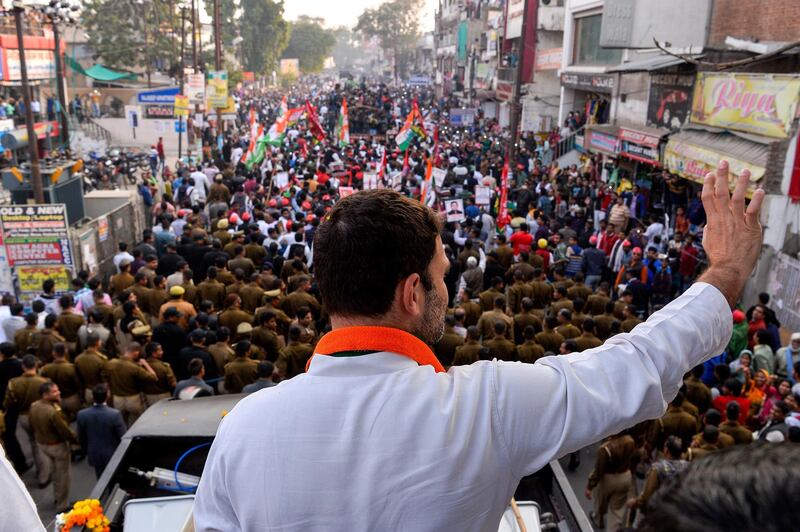When Sonia Gandhi resigned as leader of the Indian National Congress party in 1999, party workers launched a hunger strike. Some wrote her letters in blood, imploring her to stay. Within weeks, she was back at the helm.
Two decades later, it is her son, Rahul, who has stepped down as party president, following an electoral drubbing at the hands of Indian Prime Minister Narendra Modi and his BJP party in May. The question is now whether the party will move on without him, or crumble altogether – effectively transforming India into a one-party state.
Given Mr Modi’s hold over state institutions and Hindu nationalist agenda, the stakes are high. The Congress party, for all its faults, is still the primary check on his power.
Dynasties are a fixture of south Asian politics. From the Shariffs and Bhuttos in Pakistan to the Sheikhs of Bangladesh, single families have set national agendas for generations. Still, the Nehru-Gandhi family takes dynasticism to new heights.
Congress party leaders have included Mr Gandhi’s mother, father, grandmother, great-grandfather and great-great grandfather. Three of those have served as India’s prime minister.
In the process, the party has been hollowed out, weakening its ideology and ability to organise. As loyalty slowly overtook dogma, the party and the family became one and the same. No one dared come forward to lead as long as a scion of the Nehru-Gandhi clan was in charge. And yet, beneath a vaguely centre-left political attitude, the party’s higher ranks have been plagued by infighting and indecision.

Despite running an upbeat campaign, Mr Gandhi was no match for Mr Modi's folksy charm and Hindu nationalism. Many Indians saw the Congress president as the product of privilege, rather than a consequential politician in his own right.
In the end, Congress won just 52 of 543 seats in the Lok Sabha. Despite having regained control of Madhya Pradesh, Chhattisgarh and Rajasthan in statewide polls in 2018, the party lost all three in May’s general election. The BJP and its allies, with 340 seats between them, now command a potent majority.
At a state level, Congress is at risk of imploding. In the state of Karnataka, 13 Congress lawmakers have resigned, evicerating a coalition with the regional Janata Dal party that had kept the BJP at bay. State elections now loom in Maharastra, Jharkhand and Haryana.
Mr Gandhi, to his credit, has instructed the party’s working committee to select a replacement who is not from his family, although he will remain active in politics. Still, many have asked him to stay on. Others are calling for the return of his mother, Sonia, who has gravitas but would most likely face the same public perception challenges against Mr Modi.
Meanwhile, Mr Gandhi’s resignation letter seemed to pave the way for a possible return. “I am a loyal soldier of the Congress party and a devoted son of India and will continue to serve and protect her till my last breath,” he wrote.
In truth, Congress needs to be entirely reinvented and reimagined. It needs a transformative leader from outside of the Nehru-Gandhi dynasty who will break off the shackles of the past and look to the future. The new leader needs to appeal to all Indians and listen to all voices, both within the party and beyond. India’s population are young and restless. The Congress must finally offer them something new.
It is the only national party capable of holding Mr Modi to account. And at this pivotal moment, with anger and division rising across the country, India needs a strong opposition.
The success of Mr Modi, now in his second term, is attributable, in part, to the weight the modern BJP places on religious identity. In a country with a billion Hindus, 300 million from minorities – and where ties with Muslim-majority Pakistan have frayed – the BJP has been largely unassailable.
But it has also left India teetering on the brink of authoritarianism. The advent of fake news and misinformation has also hit the country hard, not only exacerbating tribalism but even spurring a surge in lynchings and murders.
India is comfortably the world’s largest democracy but it is one in which the tyranny of the majority is becoming the norm.
The death of Congress would accelerate that process – and yet it is stupefied. The Nehru-Gandhi family, and therefore the party, reportedly cannot agree upon a common course of action.
After decades of tight familial control, rescinding it will not be easy. But Congress must quickly become fighting fit, because without it, the battle for India’s future is all but lost.





